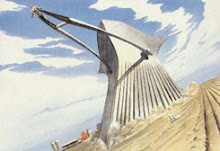 1998 | Fear and Loathing in Las Vegas
1998 | Fear and Loathing in Las Vegas
I hate the 1960s. Growing up in the 1980s, Boomer-controlled pop culture incessantly declared the "greatness" of their favorite decade. Seemingly paralyzed by their nostalgia, Boomers were incapable doing much beyond reminiscing over Woodstock, Kennedys, war protests, free love, tuning in and turning on, the summer of love, and the music of their youth. It got old.
Enter Hunter S. Thompson. Just four years after the summer of love, he's already figured out that flower power just ain't enough to fuel a cultural revolution. Drugs aren't a shortcut to enlightenment; at best, they're a way of making the absurd world we live in tolerable and at worst, a great way to annoy the hell out of the swine not using them. The protests and insistence that "all you need is love" aren't going to accomplish much: Vietnam lasted more than a decade with over 58000 Americans killed and the ultimate authoritarian square -- Nixon -- got elected twice (and once in landslide victory). The "high water mark" speech from both the novel and the film sums this up better than I could ever:
There was madness in any direction, at any hour. If not across the Bay, then up the Golden Gate or down 101 to Los Altos or La Honda. . . . You could strike sparks anywhere. There was a fantastic universal sense that whatever we were doing was right, that we were winning. . . .
And that, I think, was the handle—that sense of inevitable victory over the forces of Old and Evil. Not in any mean or military sense; we didn’t need that. Our energy would simply prevail. There was no point in fighting—on our side or theirs. We had all the momentum; we were riding the crest of a high and beautiful wave. . . .
So now, less than five years later, you can go up on a steep hill in Las Vegas and look West, and with the right kind of eyes you can almost see the high-water mark—that place where the wave finally broke and rolled back.
As for the movie itself, here Gilliam joins
Cronenberg in the exclusive club of successfully filming an "unfilmable" film. The script is great at extracting the best film story from the novel. It wisely cuts, for example, the "preparing for the trip" chapters from the beginning of the book and dumps us directly on the road to Las Vegas during the bat-infested desert drive. It also changes just enough to make the story work visually. Towards the end of the novel the narrative becomes disjointed, with the in-book excuse that the editor is transcribing Duke's tape verbatim without any editing. Though the film could've done the same thing -- editing the final days of Dr. Gonzo in Las Vegas randomly -- it might've come off looking like a bad college art film. Instead, they construct it as an
adrenochrome flashback. In addition to allowed Gilliam to cut the ending as a mixed-up drug trip, it functions as a sort of ur-drug to cap off the film's journey. After all of the alcohol, marijuana, cocaine, LSD and ether, the mythically powerful adrenochrome has to be the only way for Duke's experience in Vegas to stop.
Complementing the script, Gilliam's shooting style on the film is perfect for the subject matter. The camera drunkenly bobs and weaves when the duo are high on ether. Patterns on carpeting flow like snakes and people's faces mutate during Duke's acid trip. Fish eyes lenses, stedicams and quick cuts make the
Circus Circus-ish casino several times more insane and surreal than it would be otherwise. At a bare minimum, this is the best drug movie ever made. Happily, the story has some ideas worth chewing on as well, for those who make the effort.
"Let's get down to brass tacks: how much for the ape?" (9/10)
Watched: NTSC 2-DVD set released by Criterion in 2003. Good picture and sound. I wish Criterion would've put together a real documentary to go with the movie, though the 1978 BBC one was a lot of fun.




